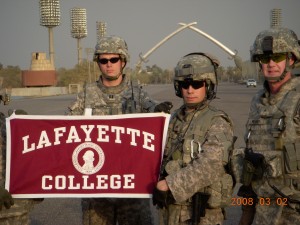By Dan Edelen
April 19, 2008 — When James M. Milano ’79 arrives at the office at 6:45 a.m., his typical schedule includes trips to local markets, checking the status of civic works projects, chatting with residents about issues like trash removal, and meeting with area political officials—all the duties expected of a mayor or commissioner in a sleepy New England town. Only Milano makes his rounds under far more hostile conditions as deputy commanding general of the Army’s 4th Infantry Division/Multi-National Division-Baghdad, stationed in Camp Liberty, Iraq.

Brigadier Gen. James M. Milano '79 (far right)
For Brigadier General Milano, whose nearly 30 years in military service have taken him to the Republic of Korea, Bosnia-Herzogovena, Germany, Kuwait, and several other countries, it’s a daunting mission overseeing the rebuilding of Baghdad’s public utilities and services. He has to overcome neglect that began in the 1980s during the Iran-Iraq War. “There is major work to be done for years to come to get infrastructure—the electrical grid, the sewer and water networks, trash removal systems, health clinics, and hospitals—functioning as it should for the citizens of Baghdad,” he says.
The work reaps its share of daily rewards. “Most places I go, I am thanked,” he says, noting that “Iraqis are, for the most part, extremely gracious, pleasant people who truly enjoy personal relationships.” That relational component makes accomplishing the mission in this part of the world a more gradual process, though. “We Americans get right down to business when we meet; [Iraqis would] rather talk first, ease into business, share a cup of chai tea, and not be as time- and agenda-driven as we tend to be. You don’t get much done your first one or two times meeting.”
Most of Milano’s work consists of meetings, “arbitrating, accommodating, and brokering among the various Iraqi government officials.” It’s more human engineering than the chemical engineering graduate trained for at Lafayette, yet it’s in keeping with the “full spectrum of conflict” the modern Army must address, from “peace-keeping and humanitarian aid operations to high-intensity conflict with dangerous, organized adversaries, and everything in-between.”
Despite living in battlefield conditions, Milano finds snatches of time for leisure, enjoying reading and donning headphones to rock with favorite bands like the Grateful Dead. He says of the work that otherwise occupies nearly 18 hours of each day, “It’s a marathon, not a sprint.”
Milano says he is proud of what he and tens of thousands of other dedicated individuals are doing for the United States in Iraq, Afghanistan, and many other places around the world.
“The Army is out in front fighting this war, and there are many sacrifices being made every day by soldiers and their families on behalf of the American people,” he says. “We’re proud to serve.” For his wife, Kim, and his three sons, Nick, Tony, and Jim, it’s a mission they pray will see him home safely in the near future.
Copyright © 2008, Lafayette College.

1 Comment
Comments are closed.